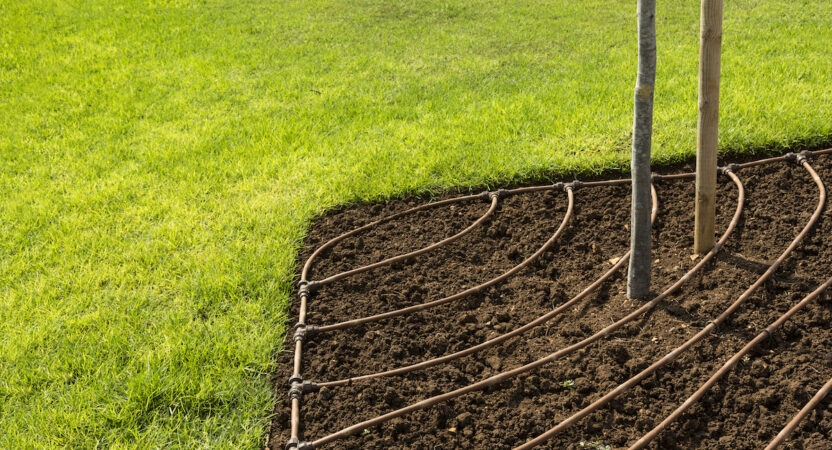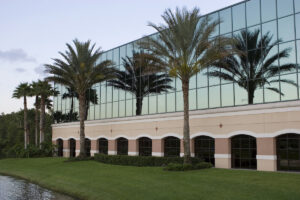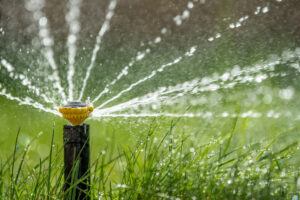Summer Landscape Maintenance: How to Conserve Water and Keep Water Costs Down in Hotter Temperatures
As temperatures heat up in San Diego, it’s important to consider the impact it has on your property’s landscape. Water management plays a key role in a successful landscape maintenance plan, especially in the summer months. Here are some ways you can conserve water usage, keep water costs down (and stay within your budget!), all while keeping your property’s landscape in its healthiest condition.
Fine-tune Irrigation Systems
Irrigation efficiency can make or break your landscape budget and is a major factor in how well your property’s landscape thrives. Here are some fundamental components of an efficient irrigation system, and recommendations on how to ensure its operating at the best of its ability.
Timing
Your property’s landscape should be watered at optimal times to ensure plants are getting adequate moisture, without a lot of waste. Your landscape maintenance provider will set a watering schedule that’s ideal for your property’s needs. For example, controllers may be set to run in early mornings or late afternoons/evenings, giving plants adequate amounts of moisture before the hottest hours of the day – meaning less water is needed to get the same results. Your landscape contractor also has to take other factors into consideration when determining the best irrigation schedule, such as planning watering times around business hours or avoiding watering when homeowners are coming to and from work.
Drip vs. Spray
Choosing the right type of irrigation components is critical for optimizing water retention and minimizing waste. There are pros and cons with each, though.
Drip irrigation systems use tubing installed above the ground to deliver water to your plants’ roots slowly. They are typically installed directly into smaller, targeted areas, eliminating the problem of over-watering and runoff – reducing water costs and conserving water. There can be some challenges with maintenance to keep in mind when using drip, however.
Spray irrigation systems are installed above the ground and deliver large streams of water to broad areas of the landscape. They typically use more water than drip systems but are needed in some cases, depending on plant type and placement. Maintenance tends to be much easier when utilizing a spray system.
Your maintenance contractor will determine what method will deliver the best, most cost-effective results for your property’s landscape.
Coverage
Water coverage is an important element in irrigation and can keep water usage down while giving plants adequate amounts of water, by offering even water distribution.
When certain areas get less water, plants begin to stress, or hot spots in turf start to appear – which can lead to overwatering.
Zones
Establishing irrigation zones can be beneficial for plant groupings that require similar amounts of water. For example, succulents require small amounts of water to thrive therefore should be grouped with plants that are relatively drought-tolerant. This prevents unnecessary water usage, keeps costs low, and overall promotes a healthy landscape.
Repairs
Your landscape maintenance provider should check irrigation components periodically throughout the year, but it’s especially important irrigation systems are running efficiently during hotter months. Repairs or replacements may be recommended by your contractor, routine inspections will be performed, and your account manager will continuously communicate with you if and when irrigation repairs are needed.
Water-Saving Enhancements
Mulch
The application of mulch offers one of the best, most cost-effective ways to enhance the health of your property’s landscape. Mulch acts as a protective ground cover that holds in moisture, reduces evaporation, helps to prevents erosion, controls weeds, and can even enrich soil conditions. Mulch also keeps soil cooler which helps to promote healthy plant growth. Mulched areas should be checked by your maintenance provider routinely and replenished, as needed – since it breaks down and decomposes over time.
Smart Irrigation
If water management is a priority for your property and budget allows, consider upgrading to a smart irrigation controller. This offers a custom watering solution, specifically tailored to meet the needs of your property’s landscape. These smart systems don’t run on preprogrammed schedules, but instead automatically adjust based on weather and soil conditions. The outcome is a healthier landscape that uses less water and costs less to maintain, long-term.
Your account manager will walk your property frequently to determine areas in need of water-saving improvements and work with you on water management plans, to ensure your property’s landscape stays healthy year-round. Contact us today with any questions!




